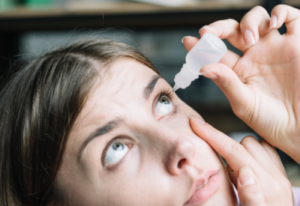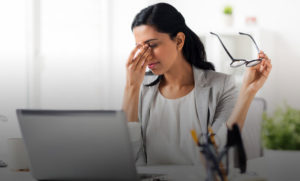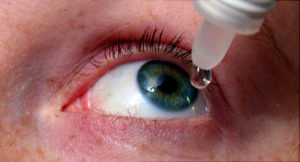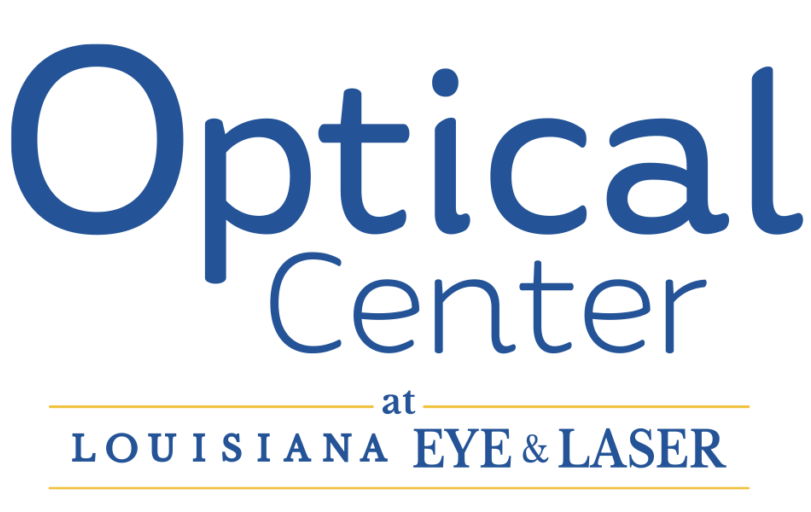
Dry eye is a common condition in which a person is unable to produce enough quality tears to nourish and protect their eyes. Dry Eye may occur for more than one reason and the appropriate treatment can vary from patient to patient. Read on below for more information about Dry Eye and answers to common patient questions.

The content below has been provided by Dr. Silva Hamade, OD, and is medically reviewed for accuracy. Some links have been added to audio transcripts to provide access to relevant resources or information.
Table of Contents:
Click on a question below to be taken directly to that answer.
- What is Dry Eye?
- How do I know if I have Dry Eye?
- What does Dry Eye feel like?
- How do you diagnose Dry Eye?
- How is Dry Eye Treated?
- Can you cure Dry Eye permanently?
- Can LASIK cause Dry Eye?
- What eye drops are best for Dry Eye?
- Is dry eye contagious?
- What is the difference between Dry Eye and Pink Eye?
- If my eyes are dry, should I go to the eye doctor?
Fortunately for those suffering from Dry Eye, the experts at Louisiana Eye & Laser have seen it all! If you believe you may be suffering from this painful condition, contact us by phone, online or by visiting one of our 14 convenient locations.

What is Dry Eye?
Answer provided by Dr. Silva Hamade, OD. Transcript included below.
Silva Hamade, OD:
Dry eye is actually a very common condition. It can affect anyone, although it gets a little bit worse as we have more birthdays in life. It’s when, really what happens is the tears that we have already are just not enough for our eyes to feel lubricated and to safely protect our eyes from the elements. It can be felt like a lot of things. It can feel like there’s something in the eye. It can feel like there’s something that’s scratching the eye, and your eyes might just feel really irritated a lot of the time during the day. It’s usually a little worse in the afternoon, but some people say that, oh, it feels that there’s much more dryness in the morning, but it really just kind of depends on the dry eyes that you have.
It can be caused by several things. Either your lacrimal gland, is what produces your tears, either it’s not producing enough or they’re draining too fast. Yeah, it really just kind of depends on what kind of dry eye you have, but it is felt by a lot of people and we can always try our best to isolate exactly what’s going on so we can treat it.
How do I know if I have Dry Eye?
Answer provided by Dr. Silva Hamade, OD. Transcript included below.
Silva Hamade, OD:
Right, right. With your allergies, it can actually cause a feeling of dry eye, but that might not mean that you actually have dry eye. Dry eyes, mostly people would feel like they’re irritated, they just feel dry, they’re burning, they’re stinging. If that happens and if it happens for a long period of time, where no matter what you do it’s just not getting better. It’s not a seasonal thing, because with allergies you can have dry eyes as well. If you feel like your dry eyes are constantly there throughout the month and it’s not going away, I would see an optometrist or an ophthalmologist because they would be able to exactly tell you what is causing this feeling, if it’s dry eye or if it’s just constant allergies.
We would take a look at the eye itself. If you do experience those symptoms of dryness, grittiness, sand in the eye, you constantly have to rub them to feel a little better, if you blinked and it feels better, those are all symptoms of dry eye. If you do experience any of those, I would recommend going to an optometrist or an ophthalmologist just so that they can take a look and determine whether or not you actually have that chronic condition.

What does Dry Eye feel like?
Answer provided by Dr. Silva Hamade, OD. Transcript included below.
Silva Hamade, OD:
Dry eye feels like there’s a little bit of… It could feel like many things really. But most commonly, people feel like there’s a little bit of grittiness in the eye, like there’s sand in their eyes, like they have to constantly rub them, and it just feels plain dry a lots of times. Sometimes people relate it to itching. It could feel like it’s a little bit itchy sometimes and they constantly have to rub their eyes. That’s another big one. Yeah, so if you do feel any of those symptoms, I recommend that you get checked out just to make sure that it’s not a chronic thing that we have to treat.
How do you diagnose Dry Eye?
Answer provided by Dr. Silva Hamade, OD. Transcript included below.
Silva Hamade, OD:
I diagnose dry eyes by determining where it’s coming from. Dry eyes can be caused by several things. It could because by the medications that you’re on. A lot of anti-histamines antidepressants, anything that’s of anti really can cause dry eye, so I take a look at their medication list just to make sure that that is not causing it.
Another thing that can cause it is the lacrimal gland is what produces the tears. If it is not producing enough tears, we have to figure out why, if it’s because a chronic autoimmune condition such as lupus or if it is just because it’s just not producing enough tears. I take a look at that component as well. And then we also check to see how the tears are draining. If they’re draining too fast, then we can do other things to prevent that.
We have oil glands that line our top and bottom lid, and these oil glands secrete oil onto our eyes every time we blink. As we get older, these oil glands just don’t work as well. They don’t secrete oil every time you blink. They may secrete oil every fifth time or six time we blink, and eventually, they just kind of stop. And if that’s the source of the dry eyes, because this oil helps to moisturize your eyes and it keeps the tears from evaporating, so if these oils just are not working, they’re not going on the eye properly, then I try to diagnose it from there. The way I diagnose dry eye is taking a look at each one of those components, everything that can possibly cause dry eyes, and then we commence the treatment from there.

How is Dry Eye treated?
Answer provided by Dr. Silva Hamade, OD. Transcript included below.
Silva Hamade, OD:
Yeah, so it’s treated based on what’s causing it. If the oil glands are involved, these are called meibomian glands, if these meibomian glands are not working as well as they should, then we go into warm compresses. The warm compresses on the eyes helps immensely for these patients because it helps the oil to kind of flow freely back in the eyes again. It helps those glands kind of… They melt a little bit more and then the oil goes on the eye more. I don’t like shooting a duck with an elephant gun, right, so we start with little things that attempt to see if it helps.
Now, if there is just not enough tears flowing onto the eye, we do artificial tears, which can be found at any drugstore. I like to avoid anything that says “Get the red out” because these just plainly make your eyes white. They don’t treat the actual dry eye. The way to treat them is to use artificial tears that actually have a lubricant in them. And these lubricants helps the symptoms, it helps to make you feel better and also keeps the eye lubricated so I recommend the artificial tears for patients with those symptoms. And so that with warm conferences helped very much for these people.
And also if your tears are draining too fast, we can do something called punctal plugs, where we actually plug the area that’s causing the drainage that’s going too fast, and that helps a lot with people. But I like to usually start a little bit slow and do the over-the-counter treatments before we go into the more invasive ones. In the beginning, I would just advise warm compresses or artificial tears, then I would see the patient back to make sure that they’re being taken care of. And if their symptoms are still there, then we go on to more other treatments, but that’s usually what I start with.
Can you cure Dry Eye permanently?
Answer provided by Dr. Silva Hamade, OD. Transcript included below.
Silva Hamade, OD:
A lot of times when patients get into the rhythm of their maintenance routine, they feel great. They don’t feel any sometimes. But can we cure it completely? Usually, it’s a chronic thing. As people may feel that there’s symptoms have gone away forever, but usually without the maintenance they probably feel like it’s a little dry. No, it cannot be cured completely.
Can LASIK surgery cause Dry Eye?
Answer provided by Dr. Silva Hamade, OD. Transcript included below.
Silva Hamade, OD:
LASIK can contribute to dry eye because just the way that the surgery is done, it has to be a little bit of an incision going into the cornea, and the cornea is where some of the nerves are. And these nerves, they actually help to tell us when our eyes are dry. Because if the nerves say, “Yep, your eyes are dry,” then it’s going to produce more tears to help you because they’re dry. But these nerves, if they’re a little bit cut from the LASIK with that incision, then there’s nothing to tell your brain to produce more tears and that’s why people might experience a little bit more of a dry eye with LASIK.
Does it cause dry eye? It might, it might, but the LASIK surgeons be sure to explain it to you beforehand and they try their best to kind of keep the integrity of all of the nerves living inside that cornea.
What eye drops are the best for Dry Eye?
Answer provided by Dr. Silva Hamade, OD. Transcript included below.
Silva Hamade, OD:
When I meet with a patient, we talk about all of their dry eye symptoms and the dry treatment that I would recommend. Now, as far as artificial tears go, when we go to the store there is 20 or 30 options there and you’re just overwhelmed technically when you go there. When I figure out what kind of dry eye you have, then I will inform the patient what’s best for them.
For example, if they have the kind of dry eye where they’re not getting enough oil onto their actual eyeballs, I recommend something called Systane Complete. Now, I love that drop a lot because it has oil and water in it, which is why they call it Complete.
It depends on what the patient is lacking. For example, if they’re also just not producing enough tears, they’re oil is fine, they’re not producing enough tears from the lacrimal gland, I would recommend more of a watery artificial tear like Refresh Optive, Systane Ultra, so those kinds of drops. They don’t have the oil in them.
Now, if someone is just really particularly sensitive to all kinds of drops and they just have chronic allergies along with their dry eye, I would recommend something that’s preservative free. Now, the reason why I would recommend something that it’s preservative free in those cases is because the preservatives in some eyedrops can be a little too harsh for the eye already. Not everyone feels this way, but some people are very sensitive to kind of the biochemical compounds in these artificial tears, which is why I go with the preservative-free ones in those especially sensitive eyes.
Examples of those are Refresh Optive with preservative-free vial, or they actually have a Systane one as well. Anything preservative free that comes in those little vials would help a lot for those people that are particularly sensitive. This brand called Oasis also has very good preservative-free ones. And I would recommend those for people that have a lot of allergies along with their eyes or they’re just particularly sensitive to a lot of things. That’s what I would recommend for those kinds of people.
For me, it would just depends on what kind of dry eye they have, I would recommend specific drops. And also the kind of drops I don’t like are the ones that say to get the red out like Visine or Clear Eyes. Because those drops they might get the red out and make your eyes nice and white, but after that medication wears off your eyes become more red than they initially were. This is called a rebound inflammation and this occurs just because of the nature of the chemicals they put in those drops, and I don’t recommend them. Because although they make your eyes look nice and white, it’s not really treating the actual symptoms, it’s not treating the underlying cause of the dry eye and irritation or redness.
Is Dry Eye contagious?
Answer provided by Dr. Silva Hamade, OD. Transcript included below.
Silva Hamade, OD:
It is not. It is not contagious.
What is the difference between Dry Eye and Pink Eye? Do I have Dry Eye or Pink Eye?
Answer provided by Dr. Silva Hamade, OD. Transcript included below.
Silva Hamade, OD:
Yeah, that’s a very good question. Dry eye and pink eye can have overlapping symptoms, but the difference between that is pink eye is caused by so many different things. It can be caused by a bacterial infection or viral infection. It can be caused by all sorts of viruses, but usually pink eye, that is the one that is contagious and it can come from someone that had pink eye already. Or if you’ve had a recent cold lately and you suddenly feel like, “Oh, my eyes are pink. They’re watery. They’re bothering me. I want to itch them. They’re irritated.” And this really acutely, and it happens very fast versus a dry eye or red eyes that come from dry eyes, you’ve obviously been filling this for quite some time and it doesn’t just come on right away. Pink eye usually gets worse over a few days, and then you feel a rapid change in your comfort level. Whereas regular red eyes, coming from irritated or dry eyes, happens kind of chronically and last more than a few weeks or months.
If my eyes are dry, should I go to the eye doctor?
Answer provided by Dr. Silva Hamade, OD. Transcript included below.
Silva Hamade, OD:
I will say that with dry eyes, it is important to be seen by a primary eye care team. Just because the dry eyes, it is not good for your eyes to be dry for a long period of time because the cornea is a clear surface and it’s right on the surface of the eye; and this cornea, if it’s not lubricated, it can start to actually get damaged, okay? And we can take note of that damage where you see you for the eye exam, so it is important to be seen if you are experiencing these symptoms because you can actually get some pretty irreversible damage and then your vision might be affected from the dry eyes.

Louisiana Eye & Laser is here to help!
After treating patients for over 40 years, the eye care experts at Louisiana Eye & Laser have seen it all. When it comes to Dry Eye, our highly-trained staff is here to help you with your unique, individual needs. With all of the latest technology and 14 locations across the state, there is no better place for all of your eye care needs than Louisiana Eye & Laser!




